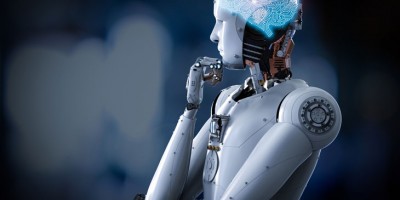17 June 2019
AI: Sci-fi or smart buy?

The artificial intelligence (AI) revolution has barely started, with many comparing its evolution to just the first page of the Gutenberg Bible or the arrival of the printing press. But with AI spending estimated to reach more than $52 billion by 2021, there’s no slowdown in sight.
AI proponents tout a range of benefits, including enhanced efficiency and throughput, solving complex problems and freeing up workers to do truly creative and value-adding tasks.
The technology is already impacting our daily lives, from built-in smart assistants on smartphones such as Alexa or Siri, to smart cars and drones. AI is curating our social media feeds, our music and media streaming services and serving up online ads based on individual preferences.
If you are travelling somewhere, AI is powering Apple and Google mapping to steer us in the right direction, while it could be watching over our homes with smart home devices and monitoring our bank accounts to protect from fraud.
And with technologies like facial and object recognition continuing to improve, it will not be too long before all security camera feeds are monitored by AI, which could make clearing airport customs a lot quicker.
Future applications
Experts surveyed by Pew Research Center predict AI will amplify human effectiveness but also potentially threaten human autonomy, agency and capabilities. Smart systems in communities, vehicles, buildings and utilities should save “time, money and lives” and offer opportunities for individuals to enjoy a “customized” future.
However, the same experts expressed concern over the long-term impacts of these tools on the “essential elements of being human.” Key concerns included decision-making being sacrificed; job losses; data abuse; and increased dependency, along with the risk of cybercrime.
More than 8,000 researchers, engineers, executives and others have signed an open letter calling for “responsible AI research that recognizes social impact” and “aligns with human values.”
Buying the right hardware
Nevertheless, with AI continuing to expand, businesses need to obtain the right software and hardware to take advantage of its capabilities.
Along with graphic processing units (GPUs), a range of new hardware architecture has been developed that is optimised for machine learning, deep learning and other AI applications.
These include neural networking processing units, field programmable gate arrays, application-specific integrated circuits and other neurosynaptic architecture, with the development of specialised AI chips.
Others suggest AI hardware will advance from GPUs to analog devices and ultimately fault tolerant quantum computers that can maximise system capabilities. Meanwhile, AI and machine learning tools continue to evolve for developers, too.
With AI coming in all sizes, from immense production scale to developer sandboxes and even production training, a range of hardware platforms are available for businesses.
The AI revolution may have barely begun, but smart businesses are already ramping up IT hardware and software systems to take advantage of its capabilities. After all, the Gutenberg Bible wasn’t printed overnight.



